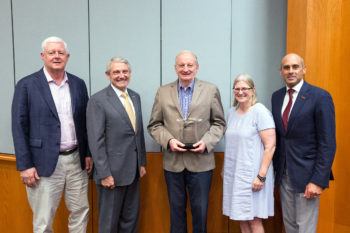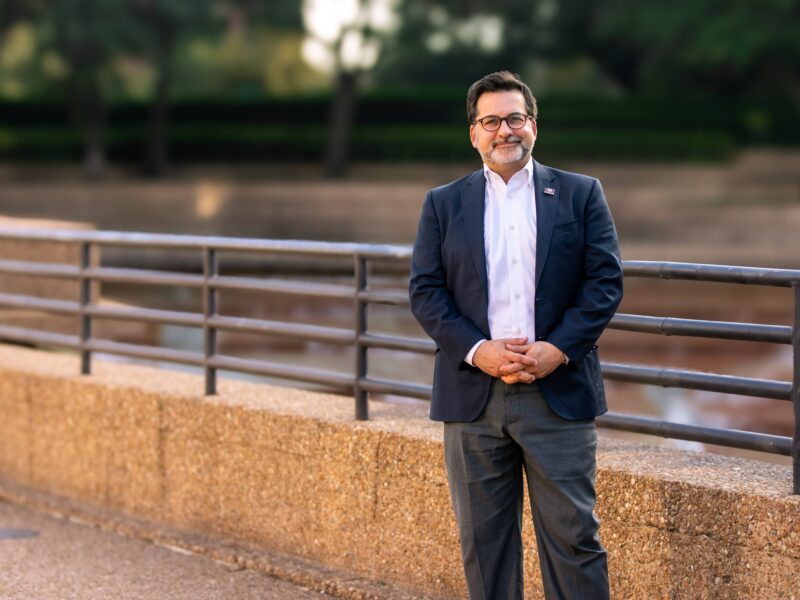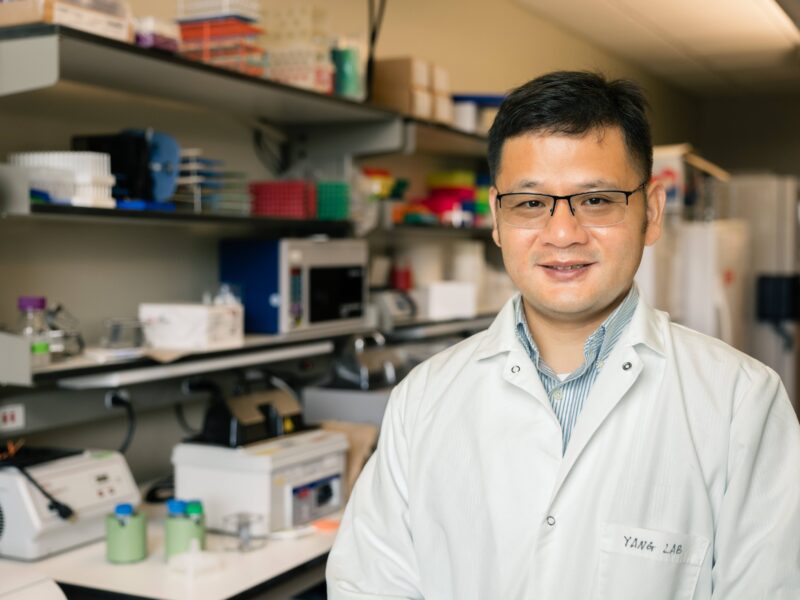Physicist Ed Fry Honored With 2019 Partner In Philanthropy Faculty Award
The Texas A&M Foundation has selected Dr. Edward S. Fry, distinguished professor and associate head for development in the Texas A&M University Department of Physics and Astronomy, as recipient of the 2019 Partner in Philanthropy Faculty Award.
Fry was recognized May 7 at the Texas A&M College of Science’s Spring Faculty Forum for his continued efforts to support and fundraise on behalf of the college, Texas A&M Physics and Astronomy, and broader university.
The Foundation’s Board of Trustees established the Partner in Philanthropy Faculty Award in 2016 to celebrate faculty members who demonstrate dedicated and lasting participation, commitment and creative leadership to philanthropy and Texas A&M University. This accolade acknowledges faculty efforts to build long-term productive relationships between the university, former students and other private partners in philanthropy.
To be selected, faculty must be nominated by a member of the Texas A&M Foundation development staff. Randy Lunsford, Texas A&M Foundation director of development for Texas A&M Science, nominated Fry for the award.
“Dr. Fry has been at the center of the resurgence of the Texas A&M physics and astronomy department,” said Tyson Voelkel, president of the Texas A&M Foundation. “With the help of several donors, he almost singlehandedly created a world-class astronomy program. He has been absolutely instrumental in making Texas A&M physics and astronomy a huge force for scientific outreach on campus.”
Fry, who holds the George P. Mitchell ’40 Chair in Experimental Physics, served as department head for physics and astronomy from 2002 to 2011, during which he is credited with helping raise more than $100 million for the department. He was instrumental in securing renowned physicist Stephen Hawking’s visits to Texas A&M, which brought great prominence to the university and set the stage for 1940 Texas A&M distinguished petroleum engineering graduate and philanthropist George P. Mitchell’s interest in growing the Texas A&M physics and astronomy programs.
Fry was such an advocate for Texas A&M that the Mitchell family’s gifts grew from an initial plan for a gift of just a few million dollars to a total in excess of $89 million to support physics and astronomy alone. Through his work, the idea of a small new building as a central home for physics and astronomy education, research and outreach grew into two facilities totaling nearly 200,000 square feet — the George P. Mitchell ’40 Physics Building and the George P. and Cynthia Woods Mitchell Institute for Fundamental Physics and Astronomy.
“These facilities, along with nine faculty chairs he helped secure, led to the recruitment of some of the best and brightest astronomers and physicists in the world to teach and research at Texas A&M,” said Foundation Trustee Bill Toler, who presented Fry with the award. “His dedication to Texas A&M Science is unmatched, and the Department of Physics and Astronomy enjoys its high-profile today in large part thanks to the private gifts he helped secure. We are very honored to present Dr. Fry with this award.”
Fry also helped secure Mitchell’s lead gift in 2004 establishing both Texas A&M and The University of Texas at Austin as founding members in the Giant Magellan Telescope project, a $1 billion effort to build the largest ground-based telescope in the world at the Las Campanas Observatory in Chile. Texas’ two flagship universities are joined by several other influential U.S. research institutions — including Harvard University, the University of Arizona and the University of Chicago — in the international project currently under construction and set to begin science operations within the next decade.
“We heartily congratulate Edward Fry on receiving the 2019 Partner in Philanthropy Faculty Award,” said Texas A&M Provost and Executive Vice President Carol A. Fierke. “He has been a valued faculty member at Texas A&M since 1969, has won numerous awards and honors in the last 50 years and is held in the highest esteem both nationally and internationally for his work in quantum mechanics, quantum optics and other research areas. In addition, he has demonstrated a strong commitment to philanthropy that has translated into increased support of faculty, staff and students in the Department of Physics and Astronomy.”
As head of the Department of Physics and Astronomy, Fry spearheaded many fundraising campaigns in support of a variety of philanthropic causes, including the William H. Bassichis Chair for Teaching Excellence in Physics and Astronomy, the Nelson M. Duller Endowed Fund in Physics and the Cynthia Woods Mitchell Undergraduate Scholarship for Women in Physics. He himself has made numerous gifts to scholarship endowments and other endowed funds in both Texas A&M Physics and Astronomy and Texas A&M Science while actively encouraging faculty in his department as well as those across the college to provide charitable gifts for Texas A&M. In addition, he has regularly supported and championed the college’s annual Physics and Engineering Festival, to which he has decided to direct the $10,000 Partner in Philanthropy monetary award.
“I think Texas A&M is a very special university and has a student body culture that is unique among most institutions in my experience,” Fry said. “I am pleased to help, as are so many of my fellow physicists and College of Science colleagues. Their incredible generosity through the years has played a big part in our success.”
Fry earned his bachelor’s, master’s and doctoral degrees in physics from the University of Michigan, where he spent a year and a half as a visiting associate professor from 1977 to 1979. He was appointed as a distinguished professor, Texas A&M’s highest honorific rank for faculty, in 2010.
In addition to academia, Fry served his profession as director of the Texas Laser Laboratory at the Houston Advanced Research Center in The Woodlands from 1994 to 1997. His research interests lie in the areas of atomic physics and light scattering, foundations of quantum mechanics and quantum optics, laser excitation and ionization of atoms, surface scattering of hydrogen atoms, multichannel scattered light polarization analysis and ocean optics.
A fellow of both the American Physical Society and the Optical Society of America, Fry also is a member of the scientific research society Sigma Xi, which honored him with its Texas A&M Distinguished Scientist Award for 2001. He has twice received Texas A&M Association of Former Students Distinguished Achievement Awards in both Teaching (1993) and Administration (2012), in addition to the Society for Optical and Quantum Electronics’ EG&G Medal in 1995. He also serves as deputy director of the Hagler Institute for Advanced Study and as a member of its Advocate Council.
This article by Shana K. Hutchins originally appeared on the College of Science website.





